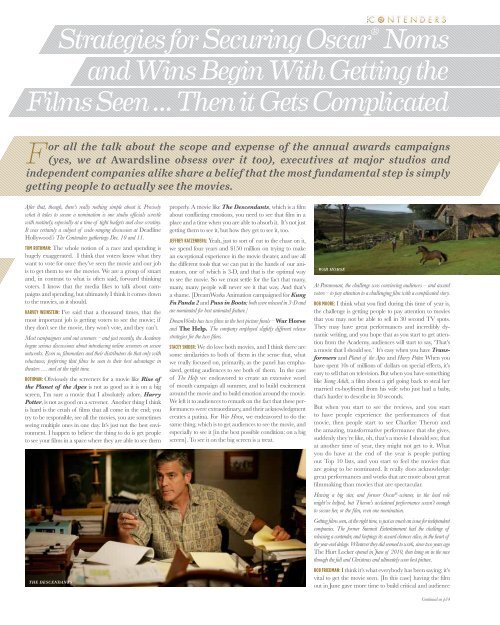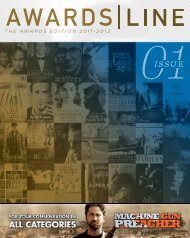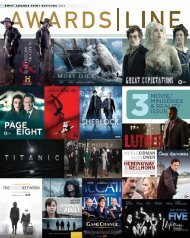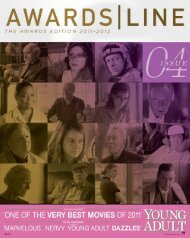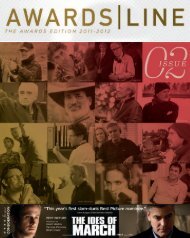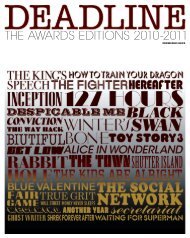THE AWARDS EDITION 2011-2012
THE AWARDS EDITION 2011-2012
THE AWARDS EDITION 2011-2012
- No tags were found...
Create successful ePaper yourself
Turn your PDF publications into a flip-book with our unique Google optimized e-Paper software.
Strategies for Securing Oscar ® Nomsand Wins Begin With Getting theFilms Seen … Then it Gets ComplicatedFor all the talk about the scope and expense of the annual awards campaigns(yes, we at Awardsline obsess over it too), executives at major studios andindependent companies alike share a belief that the most fundamental step is simplygetting people to actually see the movies.After that, though, there’s really nothing simple about it. Preciselywhat it takes to secure a nomination is one studio officials wrestlewith routinely, especially at a time of tight budgets and close scrutiny.It was certainly a subject of wide-ranging discussion at DeadlineHollywood’s The Contenders gatherings Dec. 10 and 11.TOM ROTHMAN: The whole notion of a race and spending ishugely exaggerated. I think that voters know what theywant to vote for once they’ve seen the movie and our jobis to get them to see the movies. We are a group of smartand, in contrast to what is often said, forward thinkingvoters. I know that the media likes to talk about campaignsand spending, but ultimately I think it comes downto the movies, as it should.HARVEY WEINSTEIN: I’ve said that a thousand times, that themost important job is getting voters to see the movie; ifthey don’t see the movie, they won’t vote, and they can’t.Most campaigners send out screeners – and just recently, the Academybegan serious discussions about introducing online screeners on securenetworks. Even so, filmmakers and their distributors do that only withreluctance, preferring that films be seen to their best advantage: intheaters … and at the right time.ROTHMAN: Obviously the screeners for a movie like Rise ofthe Planet of the Apes is not as good as it is on a bigscreen, I’m sure a movie that I absolutely adore, HarryPotter, is not as good on a screener. Another thing I thinkis hard is the crush of films that all come in the end; youtry to be responsible, see all the movies, you are sometimesseeing multiple ones in one day. It’s just not the best environment.I happen to believe the thing to do is get peopleto see your films in a space where they are able to see themthe descendantsproperly. A movie like The Descendants, which is a filmabout conflicting emotions, you need to see that film in aplace and a time when you are able to absorb it. It’s not justgetting them to see it, but how they get to see it, too.JEFFREY KATZENBERG: Yeah, just to sort of cut to the chase on it,we spend four years and $150 million on trying to makean exceptional experience in the movie theater, and use allthe different tools that we can put in the hands of our animators,one of which is 3-D, and that is the optimal wayto see the movie. So we must settle for the fact that many,many, many people will never see it that way. And that’sa shame. [DreamWorks Animation campaigned for KungFu Panda 2 and Puss in Boots; both were released in 3-D andare nominated for best animated feature.]DreamWorks has two films in the best picture finals – War Horseand The Help. The company employed slightly different releasestrategies for the two films.STACEY SNIDER: We do love both movies, and I think there aresome similarities to both of them in the sense that, whatwe really focused on, primarily, as the panel has emphasized,getting audiences to see both of them. In the caseof The Help we endeavored to create an extensive wordof mouth campaign all summer, and to build excitementaround the movie and to build emotion around the movie.We left it to audiences to remark on the fact that these performanceswere extraordinary, and their acknowledgmentcreates a patina. For War Horse, we endeavored to do thesame thing, which is to get audiences to see the movie, andespecially to see it [in the best possible condition: on a bigscreen]. To see it on the big screen is a treat.war horseAt Paramount, the challenge was convincing audiences – and awardvoters – to pay attention to a challenging film with a complicated story.ROB MOORE: I think what you find during this time of year is,the challenge is getting people to pay attention to moviesthat you may not be able to sell in 30 second TV spots.They may have great performances and incredibly dynamicwriting, and you hope that as you start to get attentionfrom the Academy, audiences will start to say, ‘That’sa movie that I should see.’ It’s easy when you have Transformersand Planet of the Apes and Harry Potter. When youhave spent 10s of millions of dollars on special effects, it’seasy to sell that on television. But when you have somethinglike Young Adult, a film about a girl going back to steal hermarried ex-boyfriend from his wife who just had a baby,that’s harder to describe in 30 seconds.But when you start to see the reviews, and you startto have people experience the performances of thatmovie, then people start to see Charlize Theron andthe amazing, transformative performance that she gives,suddenly they’re like, oh, that’s a movie I should see, thatat another time of year, they might not get to it. Whatyou do have at the end of the year is people puttingout Top 10 lists, and you start to feel the movies thatare going to be nominated. It really does acknowledgegreat performances and works that are more about greatfilmmaking than movies that are spectacular.Having a big star, and former Oscar ® -winner, in the lead rolemight’ve helped, but Theron’s acclaimed performance wasn’t enoughto secure her, or the film, even one nomination.Getting films seen, at the right time, is just as much an issue for independentcompanies. The former Summit Entertainment had the challenge ofreleasing a contender, and keepings its award chances alive, in the heart ofthe year-end deluge. Whatever they did seemed to work, since two years agoThe Hurt Locker opened in June of 2010, then hung on in the racethrough the fall and Christmas and ultimately won best picture.ROB FRIEDMAN: I think it’s what everybody has been saying; it’svital to get the movie seen. [In this case] having the filmout in June gave more time to build critical and audienceContinued on p34


